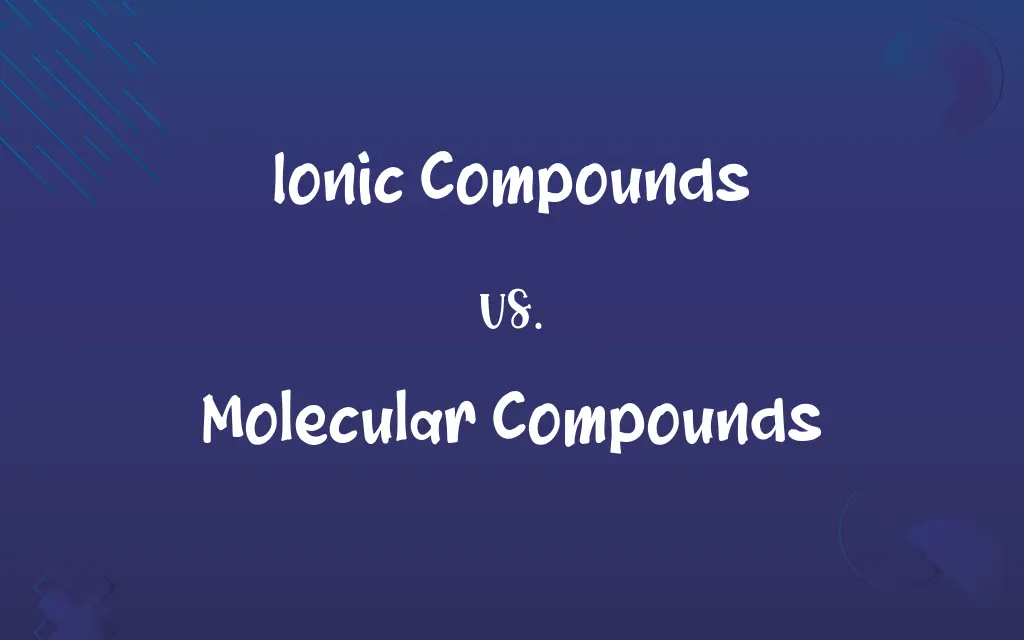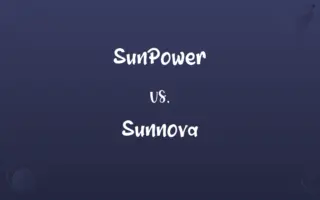Ionic Compounds vs. Molecular Compounds: Know the Difference

By Shumaila Saeed || Published on January 27, 2024
Ionic compounds are formed by the transfer of electrons and electrostatic attraction between ions, while molecular compounds result from the sharing of electrons between atoms.

Key Differences
Ionic compounds are composed of positively charged cations and negatively charged anions, held together by strong electrostatic forces. Molecular compounds, also known as covalent compounds, are formed by atoms sharing electrons, creating molecules.
Shumaila Saeed
Jan 27, 2024
In ionic compounds, the bond is typically between metals and nonmetals, with electrons being transferred from metal to nonmetal. Molecular compounds usually involve nonmetals, where atoms share electrons to achieve stability.
Shumaila Saeed
Jan 27, 2024
Ionic compounds often have high melting and boiling points due to the strength of the ionic bonds. Molecular compounds tend to have lower melting and boiling points, as the intermolecular forces are weaker than ionic bonds.
Shumaila Saeed
Jan 27, 2024
Ionic compounds usually dissolve in water and conduct electricity when dissolved or molten, due to the movement of ions. Molecular compounds, in contrast, often do not conduct electricity, as they do not form ions in solution.
Shumaila Saeed
Jan 27, 2024
Ionic compounds are typically crystalline solids at room temperature, forming lattice structures. Molecular compounds can exist in various states (solid, liquid, or gas) and do not form such rigid lattice structures.
Shumaila Saeed
Jan 27, 2024
ADVERTISEMENT
Comparison Chart
Bond Type
Electrostatic attraction between ions
Sharing of electrons between atoms
Shumaila Saeed
Jan 27, 2024
Electrical Conductivity
Conducts in solution/molten state
Generally does not conduct electricity
Shumaila Saeed
Jan 27, 2024
ADVERTISEMENT
Ionic Compounds and Molecular Compounds Definitions
Ionic Compounds
Compounds formed by the transfer of electrons and ionic bonding.
Sodium chloride (table salt) is a common ionic compound.
Shumaila Saeed
Jan 04, 2024
Molecular Compounds
Usually composed of nonmetals.
Carbon dioxide is a molecular compound of carbon and oxygen.
Shumaila Saeed
Jan 04, 2024
Ionic Compounds
Conducts electricity when dissolved or molten.
Potassium iodide conducts electricity in its molten state.
Shumaila Saeed
Jan 04, 2024
Molecular Compounds
Lower melting and boiling points compared to ionic compounds.
Methane, a molecular compound, has a very low boiling point.
Shumaila Saeed
Jan 04, 2024
Ionic Compounds
Composed of cations and anions.
Magnesium oxide is an ionic compound with Mg^2+ and O^2- ions.
Shumaila Saeed
Jan 04, 2024
ADVERTISEMENT
Molecular Compounds
Can exist in various physical states.
Ammonia, a molecular compound, is a gas at room temperature.
Shumaila Saeed
Jan 04, 2024
Ionic Compounds
Typically high melting and boiling points.
Calcium fluoride, an ionic compound, has a high melting point.
Shumaila Saeed
Jan 04, 2024
Molecular Compounds
Compounds formed by the sharing of electrons.
Water (H2O) is a molecular compound with shared electrons.
Shumaila Saeed
Jan 04, 2024
Ionic Compounds
Forms crystalline solids.
Copper sulfate forms blue crystals, characteristic of many ionic compounds.
Shumaila Saeed
Jan 04, 2024
Molecular Compounds
Generally does not conduct electricity.
Glucose, a molecular compound, does not conduct electricity in solution.
Shumaila Saeed
Jan 04, 2024
Repeatedly Asked Queries
Why do ionic compounds have high melting points?
Due to the strong electrostatic forces between ions.
Shumaila Saeed
Jan 27, 2024
Can you give an example of a molecular compound?
Water (H2O) is a common molecular compound.
Shumaila Saeed
Jan 27, 2024
What are molecular compounds?
Compounds where atoms share electrons to form molecules.
Shumaila Saeed
Jan 27, 2024
Can molecular compounds conduct electricity?
Generally, no, because they do not form ions.
Shumaila Saeed
Jan 27, 2024
What are ionic compounds?
Compounds formed by ionic bonding between positively and negatively charged ions.
Shumaila Saeed
Jan 27, 2024
What is an example of an ionic compound?
Sodium chloride (NaCl) is a classic example.
Shumaila Saeed
Jan 27, 2024
Do ionic compounds form crystals?
Yes, they often form crystalline lattice structures.
Shumaila Saeed
Jan 27, 2024
How are molecular compounds formed?
By covalent bonding, where atoms share electron pairs.
Shumaila Saeed
Jan 27, 2024
What states can ionic compounds be found in?
They are usually solid at room temperature.
Shumaila Saeed
Jan 27, 2024
Do ionic compounds conduct electricity?
Yes, but only when dissolved in water or molten.
Shumaila Saeed
Jan 27, 2024
Why are molecular compounds often gases or liquids?
They have weaker intermolecular forces, leading to lower boiling and melting points.
Shumaila Saeed
Jan 27, 2024
What are the components of an ionic compound?
A metal and a nonmetal element.
Shumaila Saeed
Jan 27, 2024
Are all molecular compounds organic?
Not all; some, like carbon dioxide, are inorganic.
Shumaila Saeed
Jan 27, 2024
How do ionic and molecular compounds differ in structure?
Ionic compounds have a lattice structure, while molecular compounds consist of discrete molecules.
Shumaila Saeed
Jan 27, 2024
Are ionic compounds soluble in water?
Many are, as water can separate the ions.
Shumaila Saeed
Jan 27, 2024
What is a key feature of molecular compounds?
The sharing of electrons between nonmetal atoms.
Shumaila Saeed
Jan 27, 2024
Can molecular compounds have multiple physical forms?
Yes, they can be solids, liquids, or gases at room temperature.
Shumaila Saeed
Jan 27, 2024
Are molecular compounds usually soluble in water?
It varies, but many are not, especially if they are non-polar.
Shumaila Saeed
Jan 27, 2024
Can molecular compounds be polar or non-polar?
Yes, they can be either, depending on the electronegativity difference between atoms.
Shumaila Saeed
Jan 27, 2024
Why are ionic compounds hard and brittle?
Due to the rigid lattice structure they form.
Shumaila Saeed
Jan 27, 2024
Share this page
Link for your blog / website
HTML
Link to share via messenger
About Author
Written by
Shumaila SaeedShumaila Saeed, an expert content creator with 6 years of experience, specializes in distilling complex topics into easily digestible comparisons, shining a light on the nuances that both inform and educate readers with clarity and accuracy.








































































